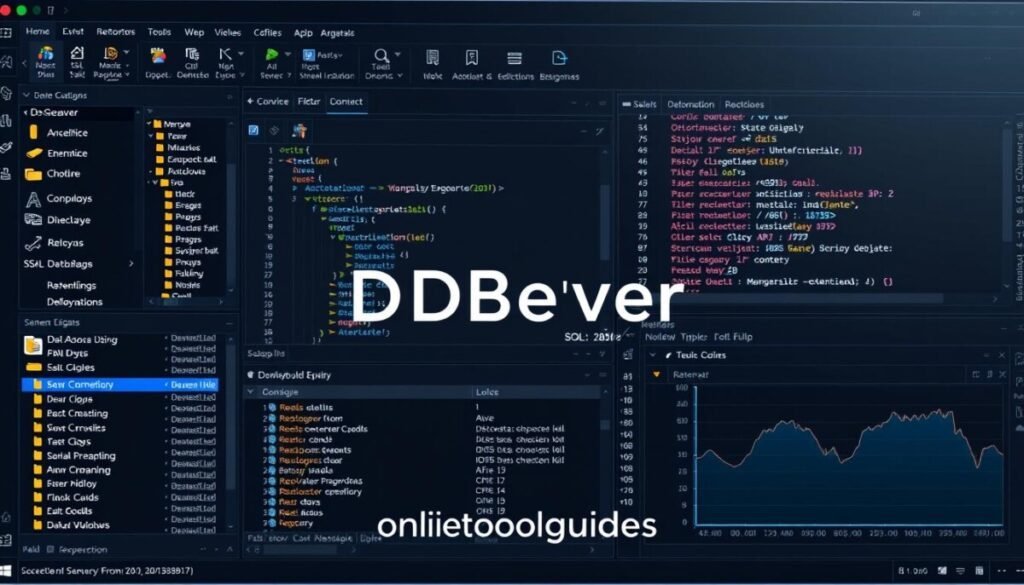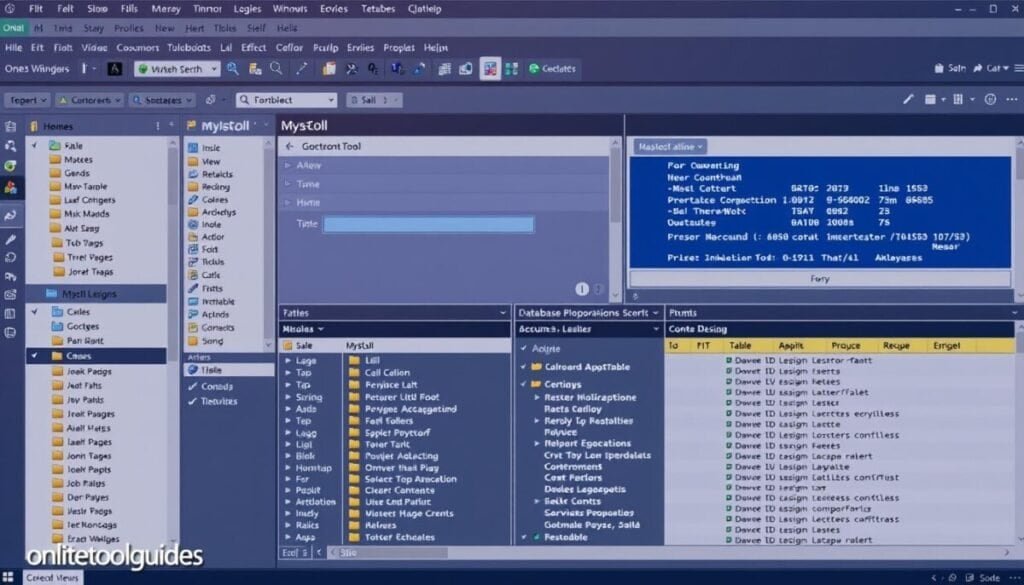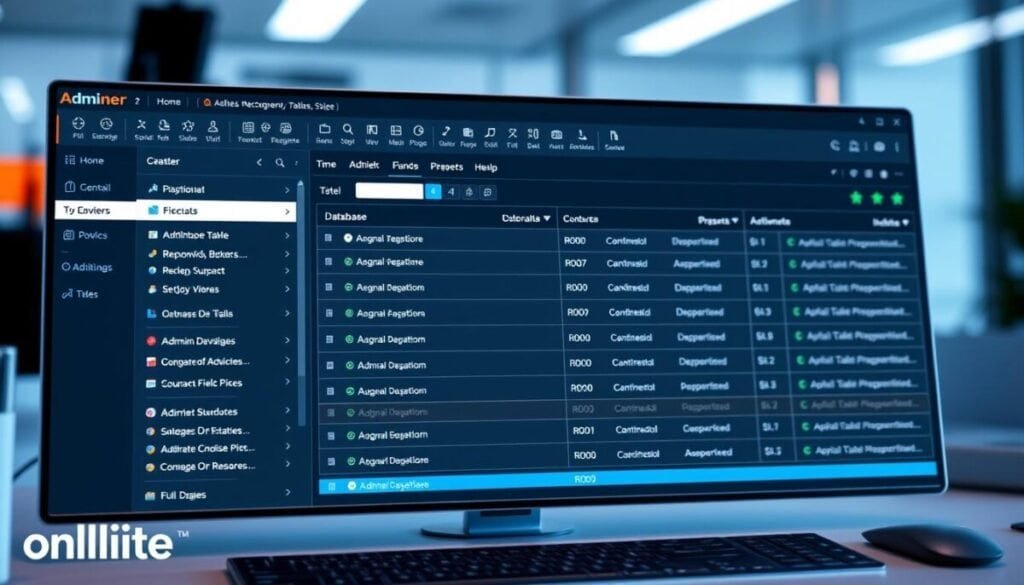Are you having trouble managing your SQL databases? Finding the right tools is key in SQL database management. We’ve searched far and wide to give you the top 10 SQL tools for better data querying and business intelligence.
These tools range from Microsoft SQL Server Management Studio to open-source like SQLite Studio. They offer many features to improve your data analysis. Whether you’re experienced or new, our list has something for you.
Since 2021, we’ve looked at over 2,000 SQL editors. We considered their core functions, standout features, ease of use, and support. Our aim is to help you find the best SQL tool for your needs and budget.
Key Takeaways
- Integrate.io excels in high-volume data replication and warehousing
- Microsoft SQL Server Management Studio offers advanced scripting capabilities
- SQLite Studio provides a cost-effective, open-source solution
- Aqua Data Studio features a user-friendly grid editing system
- Microsoft Azure Data Studio is a free, cross-platform option
- Our evaluation process weighs functionality, features, and user experience
- Customer support and value for money are crucial factors in tool selection
Understanding SQL Tools for Data Analysis
SQL tools are key for managing and analyzing data today. They help write, edit, and run SQL queries. This makes complex data tasks easier.
Definition and Purpose of SQL Tools
SQL tools offer a place for database work. They make tasks like getting, changing, and loading data simple. They also help see data better, making decisions easier.
Importance in Modern Data Management
In the big data age, SQL tools are vital. They help work with data warehouses and big datasets. SQL tools are a must for businesses to get insights from their data.
Key Features to Look for in SQL Tools
When picking SQL tools, look for these features:
- Database development and backup capabilities
- Schema editing and migration support
- Data importing and exporting functions
- Advanced SQL editing features
- Integration with data visualization tools
| SQL Tool | Starting Price | Key Feature |
|---|---|---|
| Microsoft SQL Server | $15/user/month | Comprehensive database management |
| Aqua Data Studio | $499 (single user) | Multi-platform support |
| Cluvio | $249/month | Interactive dashboards |
| Databricks SQL Analytics | $0.07/Databricks Unit | Big data analytics |
| Valentina | $79.99 | Visual query building |
Knowing about SQL tools helps us choose the best for our data needs.
Benefits of Using SQL Tools in Database Management
SQL tools have changed how we manage databases. They bring many benefits to businesses and data experts. These tools help make work easier and faster.
Many SQL tools are web-based. This means you don’t need to install software. You can manage databases from anywhere. They also have easy-to-use interfaces for everyone.
Working together is easier with SQL tools. Team members can share work and see results right away. This helps everyone work better and make decisions quicker.
Cost is important, especially for small businesses. SQL tools are often affordable. They let you work with different data formats and export to many file types.
| SQL Tool | Key Feature | Database Compatibility |
|---|---|---|
| Adminer | Lightweight web-based management | MySQL, PostgreSQL, SQLite, Oracle, MS SQL |
| DBeaver | Extensive database support | MySQL, PostgreSQL, SQLite, Oracle, MS SQL, and more |
| MySQL Workbench | Visual database design | MySQL exclusively |
| Toad for SQL Server | Advanced comparison and synchronization | SQL Server |
| SQL Server Data Tools | Project creation and deployment | SQL Server |
These tools meet different needs, from simple management to complex analysis. Using SQL tools helps organizations manage data better. They get valuable insights from their data.
Criteria for Selecting the Best SQL Tools
Choosing the right SQL tools is key for managing databases well. We’ve found important criteria to guide your choice.
Functionality and Performance
Look for tools with strong query execution and data visualization. For example, Sisense’s In-Chip tech can make some tasks 10-100 times faster. Metabase has both easy interfaces and raw SQL for all skill levels.
User Interface and Ease of Use
A simple interface boosts productivity. Redash has a user-friendly setup for queries and integrations. Datapine SQL Editor is great for beginners, available anytime, anywhere.
Compatibility with Different Database Systems
Today’s data world is diverse. SQuirrel SQL works with many databases, including Microsoft Access and Oracle. DBeaver is open-source and improves data visualization across platforms.
Cost and Licensing Considerations
Cost is a big factor in choosing tools. Some, like Oracle SQL Developer and MySQL Workbench, are free. Others have different pricing:
| Tool | Pricing Model | Cost |
|---|---|---|
| Aqua Data Studio | One-time fee | $499 per user |
| SQLyog | Monthly subscription | $12 per user/month (annual billing) |
| Navicat for SQL Server | Monthly subscription | $9 per user/month (annual billing) |
| JetBrains DataGrip | Monthly subscription | $8.90 per user/month (annual billing) |
By looking at these criteria, you can pick SQL tools that meet your needs. This will improve your data analysis and database management.
Top 10 SQL Tools for Efficient Data Analysis
SQL tools are key in today’s data world. We’ve picked the top 10 SQL tools for great data analysis. They help with data visualization and SQL reporting. These tools are for all levels, from newbies to experts. One of the most popular SQL tools is Microsoft SQL Server Management Studio, which is known for its user-friendly interface and efficient data management capabilities. In addition, tools like Oracle SQL Developer and MySQL Workbench are also highly regarded for their robust features and extensive database support. When it comes to data analysis, many professionals often debate the merits of pandas vs numpy, two popular Python libraries that offer powerful data manipulation and analysis tools. Overall, the top SQL tools empower users to make the most of their data and derive valuable insights for informed decision-making.

| Tool | Key Features | Pricing |
|---|---|---|
| Microsoft SQL Server Management Studio (SSMS) | Integrated SQL environment, server-side management | Free |
| DBeaver | Multi-database support, open-source | Free |
| Oracle SQL Developer | PL/SQL development, Oracle database management | Free |
| MySQL Workbench | Visual database design, performance tuning | Free |
| Toad for SQL Server | Comprehensive database management | Paid |
| Adminer | Lightweight, web-based, multi-database support | Free |
| SQL Server Data Tools (SSDT) | Integrated development environment | Free |
| Tableau | Interactive visualizations, actionable insights | Paid |
| Power BI | Cloud-based analytics, data visualization | $9.99/month |
| KNIME | Data integration, predictive analytics | Free |
These SQL tools have many features for data warehousing and visualization. You can find free tools like DBeaver and MySQL Workbench. Or, you can choose paid options like Toad for SQL Server and Tableau.
Cloud-based analytics are becoming more popular. Tools like Power BI are getting more attention. They offer scalability and easy access.
Microsoft SQL Server Management Studio (SSMS)
Microsoft SQL Server Management Studio (SSMS) is a top tool for database management. It works with SQL Server, Azure SQL Database, and Azure Synapse Analytics. It has tools for developers and database admins at all levels.
SSMS is very flexible. It handles Analysis Services, Integration Services, and Reporting Services. You can write scripts in languages like MDX and DAX. This makes it great for big data analytics.
The Query Editor in SSMS is a big plus. It helps write and run T-SQL queries well. The Object Explorer makes it easy to manage database objects. It shows them in a table with a search feature.
| Feature | Description |
|---|---|
| Integrated Environment | Manages SQL infrastructure, runs SSIS packages, creates packages via Import/Export Wizard |
| Query Editor | Writes and executes T-SQL queries efficiently |
| Object Explorer | Views and manages objects in tabular format with search functionality |
| Template Scripts | Provides customizable scripts for creating databases, tables, views, and more |
SSMS also has template scripts for making database objects. This makes setting up new databases and tables easier. It’s a big help for data mining.
SSMS only works on Windows. But, it’s still a favorite for SQL Server management. For those who need cross-platform tools, Azure Data Studio is a good alternative. It works on macOS and Linux too.
DBeaver: A Versatile Open-Source SQL Tool
DBeaver is a strong open-source SQL tool. It works with many databases like MySQL, PostgreSQL, SQLite, and Oracle. This makes it great for different data tasks.

Key Features of DBeaver
DBeaver has many useful features for managing SQL databases:
- Supports many databases from one place
- Advanced SQL Editor with color coding and auto-complete
- Tools for making charts and reports
- Makes ER diagrams automatically
- Can import and export data in CSV, SQL, and Excel
Pros and Cons
DBeaver is good because it’s flexible and easy to use. It helps developers, analysts, and admins. You can change settings and add plugins to work better.
But, it can slow down with big data. This might make it hard to work with large databases.
Ideal Use Cases
DBeaver is great for many things:
- Working on databases and making them better
- Doing data analysis and making reports
- Managing databases on different systems
- Using it with business intelligence software
With its wide range of features and support for many databases, DBeaver is very helpful for those with big data jobs.
| Feature | Description |
|---|---|
| Database Support | MySQL, PostgreSQL, SQLite, Oracle, and more |
| SQL Editor | Syntax highlighting, auto-completion, error tracking |
| Data Visualization | Charts and visual reports creation |
| ER Diagrams | Automatic generation for visual database structure |
| Customization | Plugins, shortcuts, and tailored settings |
Oracle SQL Developer: Comprehensive Oracle Database Management
Oracle SQL Developer is a powerful tool for managing Oracle databases. It’s free and has a graphical interface. It offers many features for data visualization, warehousing, and SQL reporting.
Its Statistics tab gives insights into table structure and data. It shows table size, row and column counts, and data types. A bar graph helps visualize top unique column values.
SQL Developer also helps with complex data structures. It lets you create analytic views with multiple hierarchies. The Hierarchies tab shows the generated hierarchies and their source tables.
The Measures tab suggests measures for analytic views. It shows measure names, columns, and operator expressions. This makes creating data aggregations for reports easier.
| Feature | Description |
|---|---|
| Statistics Tab | Provides table size, row/column counts, distinct values, data types |
| Analytic Views | Supports multiple hierarchies, measures, and member descriptions |
| Data Sources Tab | Graphically displays fact table and dimension table relationships |
| Cloud Integration | Offers unified console for on-premises and cloud databases |
Oracle SQL Developer works well with Oracle Database Management Cloud Service. It provides a unified console for both on-premises and cloud databases. This makes managing multiple Oracle databases easier.
MySQL Workbench: Powerful Visual Database Design Tool
MySQL Workbench is a top pick for database experts. It’s easy to use and works on Windows, Linux, and Mac OS X. This makes it great for managing databases.
Visual SQL Editor and Database Modeling
MySQL Workbench is great for designing databases visually. You can make and change models easily. It also lets you turn models into scripts or databases.
The SQL editor has cool features like syntax highlighting and auto-completion. These help you work faster, especially with big data.

Performance Tuning and Optimization Features
This tool is full of features for managing databases. It has smart code completion and tools for making databases run better. It’s perfect for improving database performance.
Database Migration Capabilities
MySQL Workbench makes moving databases easy. It helps convert schemas and move data from other systems to MySQL. This makes working with different data sources simpler.
| Feature | Description |
|---|---|
| Pricing | Free Community Edition, $11.99/month subscription, $129.00 perpetual license |
| Trial Period | 14-day free trial |
| Platforms | Windows, Linux, macOS |
| Key Features | Visual modeling, SQL editor, performance tools, migration utilities |
MySQL Workbench is a strong tool for database work. It has great design tools, performance features, and migration tools. It’s a big help for those working with big data and databases.
Toad for SQL Server: Advanced Database Management Solution
Toad for SQL Server is a top-notch SQL database management tool. It has many features that make working with data easy. You can roll back transactions, recall SQL scripts, and test scripts across multiple databases.
Toad’s team tools are great for working together on projects. Its customer support is excellent, helping users solve problems fast. Even though it costs more than some tools, its value is clear.
Toad is perfect for complex database needs. It’s a top pick for businesses needing advanced data tools. It’s great for handling big projects, loved by database experts.
Some users might find Toad’s interface old-fashioned. But, its features are so good, it’s worth it. For those looking for top business intelligence software, Toad has lots to offer. It makes database work easier and more productive.
| Feature | Benefit |
|---|---|
| Transaction Rollback | Ensures data integrity |
| SQL Script Recall | Improves efficiency |
| Multi-Database Testing | Enhances reliability |
| Team Collaboration Tools | Boosts productivity |
In the world of SQL tools, Toad for SQL Server is a standout. It has a wide range of features for different database needs. It’s a key tool for businesses that rely on data for making decisions.
Adminer: Lightweight Web-Based Database Management
Adminer is a strong, yet light web tool for managing databases. It’s open-source and makes handling data easy. It’s great for many data needs and SQL reports.
Simplicity and Ease of Use
Adminer’s interface is easy for all to use. It’s perfect for developers and advanced users. You can deploy it with just one file and use it online.
It lets you make new MySQL databases and change old ones. You can also do complex SQL tasks with a few clicks.

Multi-Database Support
Adminer works with many databases. It supports MySQL, PostgreSQL, SQLite, MS SQL, Oracle, and MongoDB. This makes it great for managing different data tools and solutions.
Security Features
Adminer focuses on keeping your data safe. It’s more secure than many tools. It also works in many languages, reaching users worldwide.
| Feature | Description |
|---|---|
| Database Support | MySQL, PostgreSQL, SQLite, MS SQL, Oracle, MongoDB, and more |
| User Rating | 4.9/5 stars |
| Language Support | Available in 43 languages |
| Key Functions | Create databases, alter structures, execute SQL operations, manage tables |
Adminer is great for data analysis and management. It’s simple, supports many databases, and is very secure. It’s a key tool for SQL reports.
SQL Server Data Tools (SSDT): Integrated Development Environment
SQL Server Data Tools (SSDT) is a top tool for database developers. It works well with Visual Studio, making it great for creating and managing SQL Server databases. SSDT is known for its strong features and easy-to-use interface.
SSDT uses T-SQL, which is a special SQL version. It adds procedural programming and error handling to queries. This makes it perfect for complex data tasks.
SSDT is also great for teamwork. It works with source control systems, helping teams keep track of changes. This is super helpful for big database projects.
SSDT makes deploying databases easier. It creates scripts automatically, cutting down on mistakes. It also handles schema changes without needing manual scripts.
| Feature | Benefit |
|---|---|
| T-SQL Support | Enhanced query processing |
| In-memory processing | Improved performance for transaction-intensive workloads |
| Version control integration | Better collaboration and change tracking |
| Automated deployment | Reduced errors and manual intervention |
| Schema comparison | Easy reconciliation of database differences |
SSDT has many benefits, but it’s not perfect. It might struggle in very complex setups. Also, it might not support all database objects. New users might find it hard to get used to Visual Studio.
Comparing SQL Tools: Features, Pricing, and User Experience
We’ve looked at many SQL database management tools. Now, let’s compare them. When picking data querying tools, we must think about features, cost, and how easy they are to use. Some tools, like BlazeSQL, have different prices. They offer plans from $39/month for Blaze Pro to custom prices for Blaze Enterprise.
Looker Studio is a strong business intelligence software. It uses a pay-as-you-go model. Prices start at $0.04 to $0.10 per slot hour, with discounts for longer use. They also charge $0.02 per GiB per month for active storage, with the first 10 GiB free each month.
User experience is very important in SQL tools. Panoply has an in-browser SQL editor, making it easier to analyze data. Amazon Athena and Google BigQuery offer SQL-based analytics in the cloud. Informatica PowerCenter has automated data validation, and Stitch Data handles errors automatically.
When choosing SQL tools, think about what you need. Do you want cloud-based solutions like AWS or Azure? Or maybe you need tools for data integration like Microsoft SQL Server SSIS? By looking at these points, we can pick the best SQL database management tool for our data analysis needs.



